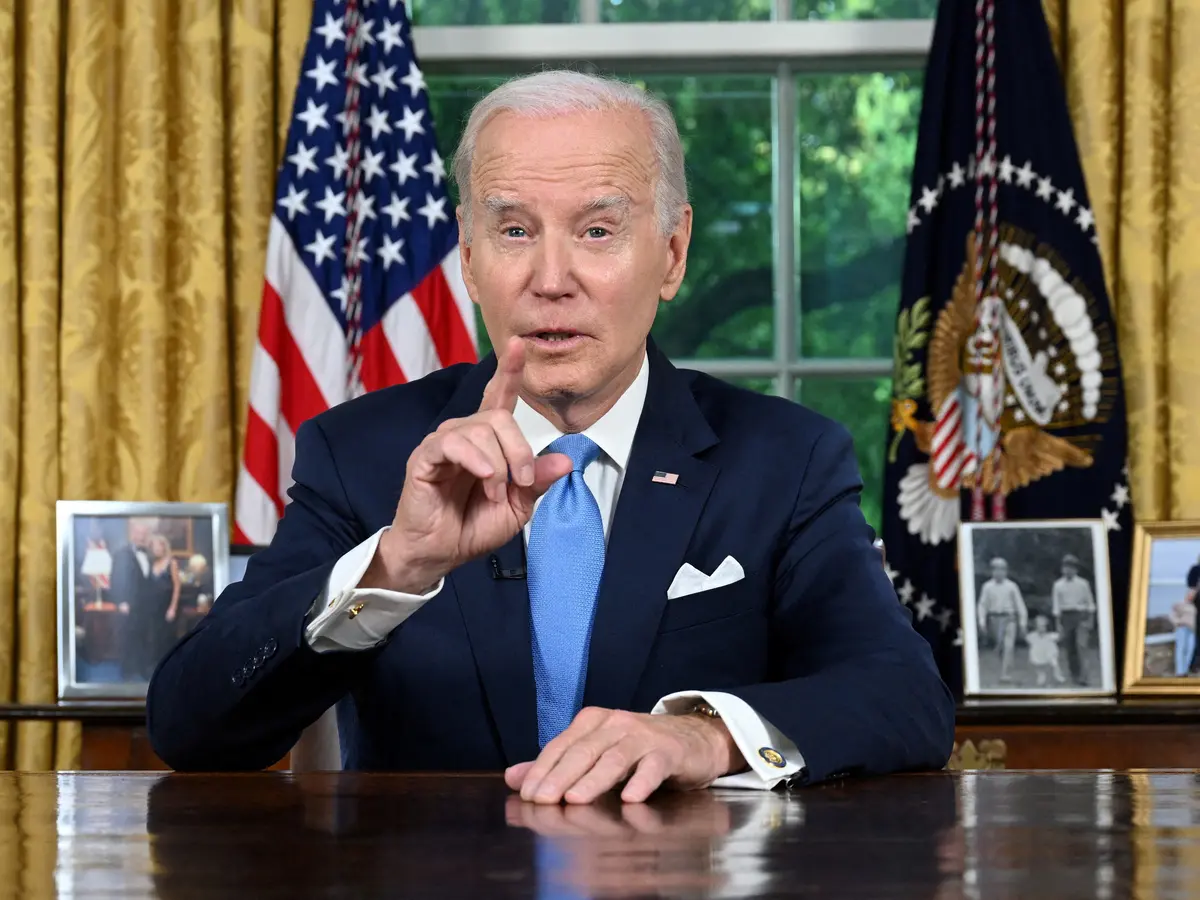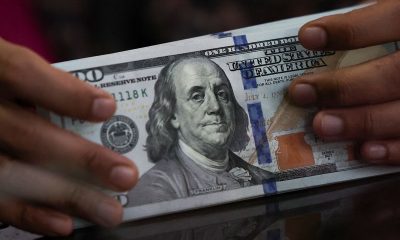Economy
Biden cheers debt ceiling ‘crisis averted’ from Oval Office

U.S. President Joe Biden declared a “crisis averted” on Friday in his first address from the White House’s Oval Office, touting the passage of a bill to suspend the U.S. debt ceiling and avoid economic catastrophe.
Biden used the moment to plead with Americans to bridge their divides, saying his compromise with top Congress Republican Kevin McCarthy showed what could be done.
“No matter how tough our politics gets, we need to see each other not as adversaries but as fellow Americans,” he said, asking Americans to “stop shouting, lower the temperature and work together to pursue progress.”
Biden, a Democrat, said he would sign the bill into law on Saturday, concluding months of uncertainty and averting what would have been a first-ever U.S. default as early as June 5.
“It was critical to reach an agreement, and it’s very good news for the American people. No one got everything they wanted. But the American people got what they needed,” Biden said while sitting at the historic “Resolute Desk” in the presidential office.
“We averted an economic crisis, an economic collapse,” he said.
After nail-biting negotiations, both the Senate and the House of Representatives passed a bill this week that suspends the government’s $31.4 trillion debt ceiling.
Biden said to preserve U.S. economic progress it was critical to keep the country’s full faith and credit in tact. “The stakes could not have been higher,” Biden said.
The president, who is running for re-election, noted other bipartisan bills he has signed and offered praise to McCarthy, the speaker of the House of Representatives, who was his primary negotiating partner.
McCarthy, a supporter of former President Donald Trump, was one of 147 Republicans who voted, unsuccessfully, to overturn the 2020 election that Biden won.
“We were able to get along, get things done,” Biden said. “Both sides operated in good faith.”
Republicans refused to increase the debt ceiling for months, asking Biden and Democrats to cut spending in the 2024 budget in return. The White House asked for a clean debt ceiling deal before starting negotiations.
Ultimately Biden and McCarthy cobbled together a last-minute deal that suspends the debt limit until January of 2025 and caps spending.
The Republican-controlled House voted 314 to 117 to approve the bill, and the Democrat-controlled Senate voted 63 to 36.
“The final vote in both chambers was overwhelming,” Biden said.
Fitch Ratings said on Friday the United States’ “AAA” credit rating would remain on negative watch, despite the agreement that will allow the government to meet its obligations.
OVAL OFFICE ADDRESS
U.S. presidents have generally reserved an address from the Oval Office for the most significant, and dramatic of events: the attacks of Sept. 11, 2001, for example, or the Challenger space shuttle explosion.
The White House said Biden was making his remarks there because of the gravity of the situation had the debt ceiling not been raised.
Former President Ronald Reagan spoke to the nation from the Oval Office after the explosion of the Challenger space shuttle in 1986; and former President George W. Bush used the venue to address the country after the Sept. 11, 2001 attacks. Former President Barack Obama made remarks from the Oval Office in the aftermath of the 2010 BP (NYSE:BP) oil spill in the Gulf Coast.
Biden, who came into office in January 2021, has spoken before during ‘primetime’ hours, including his State of the Union addresses from the Capitol and a speech from the White House East Room during the COVID-19 pandemic.
But the Friday night address is his first from the Oval Office, a setting that highlights the power and authority of the presidency, as Biden seeks a second term against a growing field of Republican candidates.
Economy
Russian central bank says it needs months to make sure CPI falling before rate cuts -RBC


© Reuters. Russian Central Bank Governor Elvira Nabiullina attends a news conference in Moscow, Russia June 14, 2019. REUTERS/Shamil Zhumatov/File Photo
MOSCOW (Reuters) – Russia’s central bank will need two to three months to make sure that inflation is steadily declining before taking any decision on interest rate cuts, the bank’s governor Elvira Nabiullina told RBC media on Sunday.
The central bank raised its key interest rate by 100 basis points to 16% earlier in December, hiking for the fifth consecutive meeting in response to stubborn inflation, and suggested that its tightening cycle was nearly over.
Nabiullina said it was not yet clear when exactly the regulator would start cutting rates, however.
“We really need to make sure that inflation is steadily decreasing, that these are not one-off factors that can affect the rate of price growth in a particular month,” she said.
Nabiullina said the bank was taking into account a wide range of indicators but primarily those that “characterize the stability of inflation”.
“This will take two or three months or more – it depends on how much the wide range of indicators that characterize sustainable inflation declines,” she said.
The bank will next convene to set its benchmark rate on Feb. 16.
The governor also said the bank should have started monetary policy tightening earlier than in July, when it embarked on the rate-hiking cycle.
Economy
China identifies second set of projects in $140 billion spending plan


© Reuters. FILE PHOTO: Workers walk past an under-construction area with completed office towers in the background, in Shenzhen’s Qianhai new district, Guangdong province, China August 25, 2023. REUTERS/David Kirton/File Photo
SHANGHAI (Reuters) – China’s top planning body said on Saturday it had identified a second batch of public investment projects, including flood control and disaster relief programmes, under a bond issuance and investment plan announced in October to boost the economy.
With the latest tranche, China has now earmarked more than 800 billion yuan of its 1 trillion yuan ($140 billion) in additional government bond issuance in the fourth quarter, as it focuses on fiscal steps to shore up the flagging economy.
The National Development and Reform Commission (NDRC) said in a statement on Saturday it had identified 9,600 projects with planned investment of more than 560 billion yuan.
China’s economy, the world’s second largest, is struggling to regain its footing post-COVID-19 as policymakers grapple with tepid consumer demand, weak exports, falling foreign investment and a deepening real estate crisis.
The 1 trillion yuan in additional bond issuance will widen China’s 2023 budget deficit ratio to around 3.8 percent from 3 percent, the state-run Xinhua news agency has said.
“Construction of the projects will improve China’s flood control system, emergency response mechanism and disaster relief capabilities, and better protect people’s lives and property, so it is very significant,” the NDRC said.
The agency said it will coordinate with other government bodies to make sure that funds are allocated speedily for investment and that high standards of quality are maintained in project construction.
($1 = 7.1315 renminbi)
Economy
Russian central bank says it needs months to make sure CPI falling before rate cuts -RBC


© Reuters. Russian Central Bank Governor Elvira Nabiullina attends a news conference in Moscow, Russia June 14, 2019. REUTERS/Shamil Zhumatov/File Photo
MOSCOW (Reuters) – Russia’s central bank will need two to three months to make sure that inflation is steadily declining before taking any decision on interest rate cuts, the bank’s governor Elvira Nabiullina told RBC media on Sunday.
The central bank raised its key interest rate by 100 basis points to 16% earlier in December, hiking for the fifth consecutive meeting in response to stubborn inflation, and suggested that its tightening cycle was nearly over.
Nabiullina said it was not yet clear when exactly the regulator would start cutting rates, however.
“We really need to make sure that inflation is steadily decreasing, that these are not one-off factors that can affect the rate of price growth in a particular month,” she said.
Nabiullina said the bank was taking into account a wide range of indicators but primarily those that “characterize the stability of inflation”.
“This will take two or three months or more – it depends on how much the wide range of indicators that characterize sustainable inflation declines,” she said.
The bank will next convene to set its benchmark rate on Feb. 16.
The governor also said the bank should have started monetary policy tightening earlier than in July, when it embarked on the rate-hiking cycle.

 Forex3 years ago
Forex3 years agoForex Today: the dollar is gaining strength amid gloomy sentiment at the start of the Fed’s week

 Forex3 years ago
Forex3 years agoUnbiased review of Pocket Option broker

 Forex3 years ago
Forex3 years agoDollar to pound sterling exchange rate today: Pound plummeted to its lowest since 1985

 Forex3 years ago
Forex3 years agoHow is the Australian dollar doing today?

 Cryptocurrency3 years ago
Cryptocurrency3 years agoWhat happened in the crypto market – current events today

 World3 years ago
World3 years agoWhy are modern video games an art form?

 Commodities3 years ago
Commodities3 years agoCopper continues to fall in price on expectations of lower demand in China

 Economy3 years ago
Economy3 years agoCrude oil tankers double in price due to EU anti-Russian sanctions























